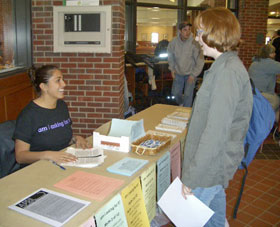Education, Advocacy Key To
Preventing Violence Against Women
 |
| Marissa Perelli, a senior majoring family studies, speaks with Tara Maroney, a junior majoring in marketing and journalism, about Denim Day. The April 12 event was part of Sexual Assault Awareness Month. . |
|
Photos by Dollie Harvey |
Would you stay in a relationship with someone who insulted you in front of your friends? Would you be humiliated? If someone threw a soft object like a pillow at you, would you say there was intent to harm you?
These are among the questions students were asked during a recent workshop called “Heart on a Chain: Dating Violence,” given by peer educators from the University’s Violence Against Women Prevention Program. The workshop – one of 10 that are offered – helps participants recognize different types of abuse, and identifies campus resources and other support services.
“We try to get people to think about what is a healthy relationship versus what isn’t,” says Hilary Jones, a senior majoring in women’s studies, who has been a workshop facilitator for three years.
The Violence Against Women Prevention Program, sponsored by the Women’s Center, consists of student volunteers trained to present workshops on issues including sexual assault, dating violence, sexual harassment, and sex role socialization. The peer educators hold workshops for about 4,000 students each year in residence halls, sororities, fraternities, First Year Experience classes, and during orientation. They also make presentations in local high schools. Members of the program are trained through a one-credit women’s studies course. About 25 students are trained annually.
Kathleen Holgerson, director of the Women’s Center, says the program plays an “important role in eliminating violence against women on our campus.” The program was first created as the Rape Education Program in 1980, in response to an incident on campus.
“We work with students from the moment they enter during orientation,” she says. “That continues throughout their University experience, both in terms of education and advocacy and support services.”
One of the most popular workshops, says Jones, is “How to Be a Better Lover: Men, Women, and the Gender Gap.” The title “is intriguing and draws a lot of people,” she says. The workshop addresses sexual assertiveness, personal sexuality, and communication in relationships. “The questions we get at this workshop revolve around sexual assault and policies dealing with it,” Jones adds.
April is Sexual Assault Awareness Month, and the Women’s Center is sponsoring a variety of events to support ending sexual violence.
They are:
April 20 – Take Back the Night: March, Rally, and Coffeehouse.
All survivors of sexual violence, secondary survivors (those affected by it),
and friends are invited. The march begins at the Student Union with a rally
and guest speakers, music, and
a candlelight vigil. 7 p.m., Student Union Lobby.
April 21 – Day of Healing. An evening of empowerment to begin the healing process for survivors and secondary survivors. 6 p.m., Women’s Center lounge.
April 28 – Shine the Light on Sexual Violence. This is the closing ceremony for the month. The candlelight vigil is designed to encourage the community to spotlight sexual assault awareness. 8 p.m., Dow Field (old Co-op site).

